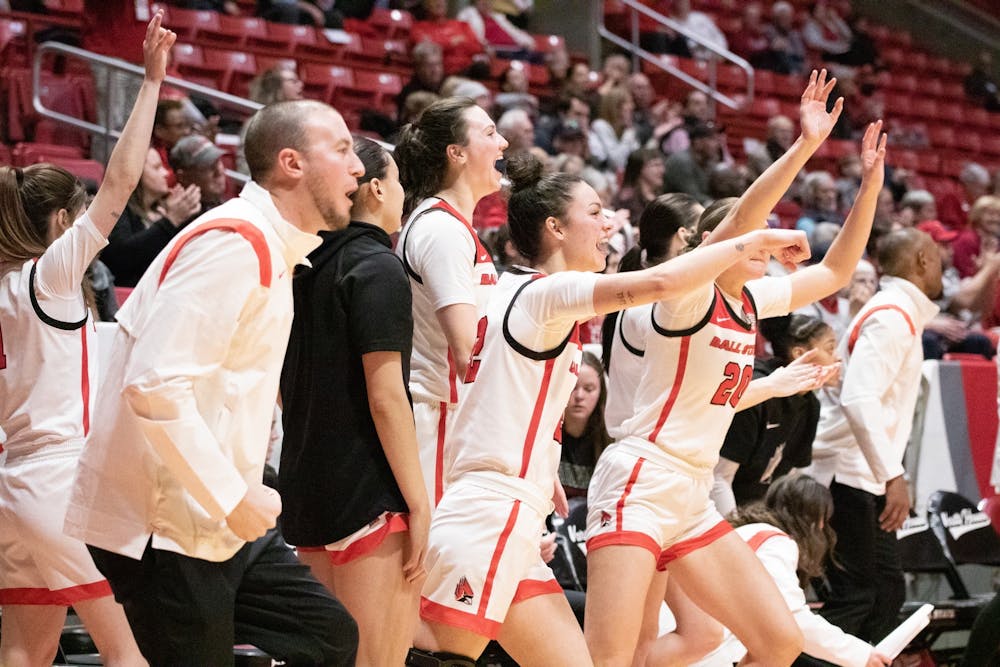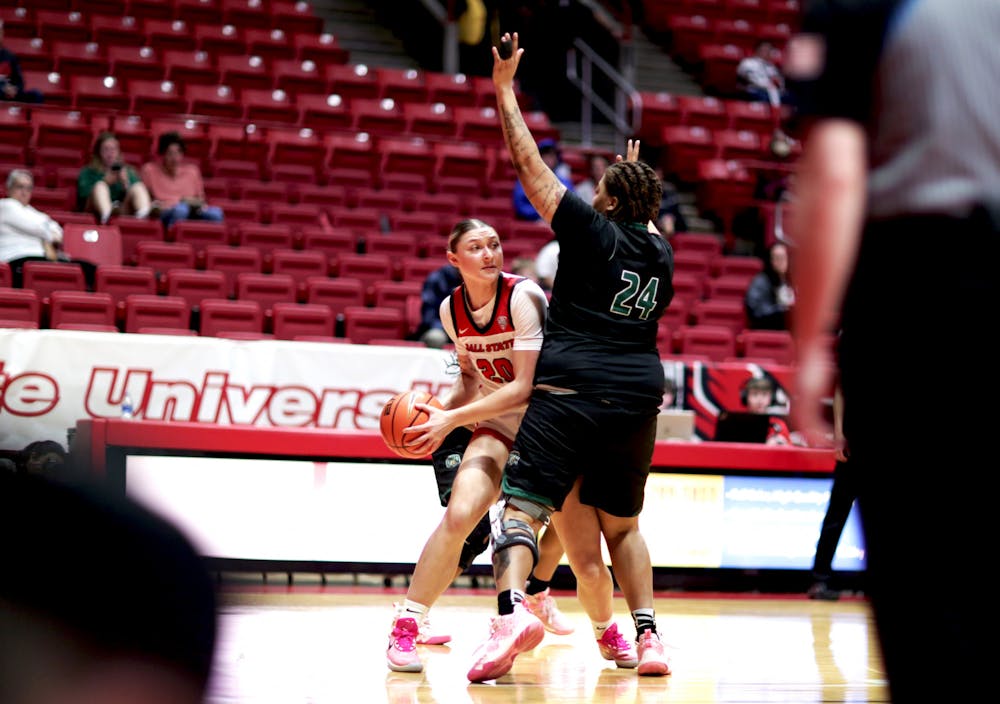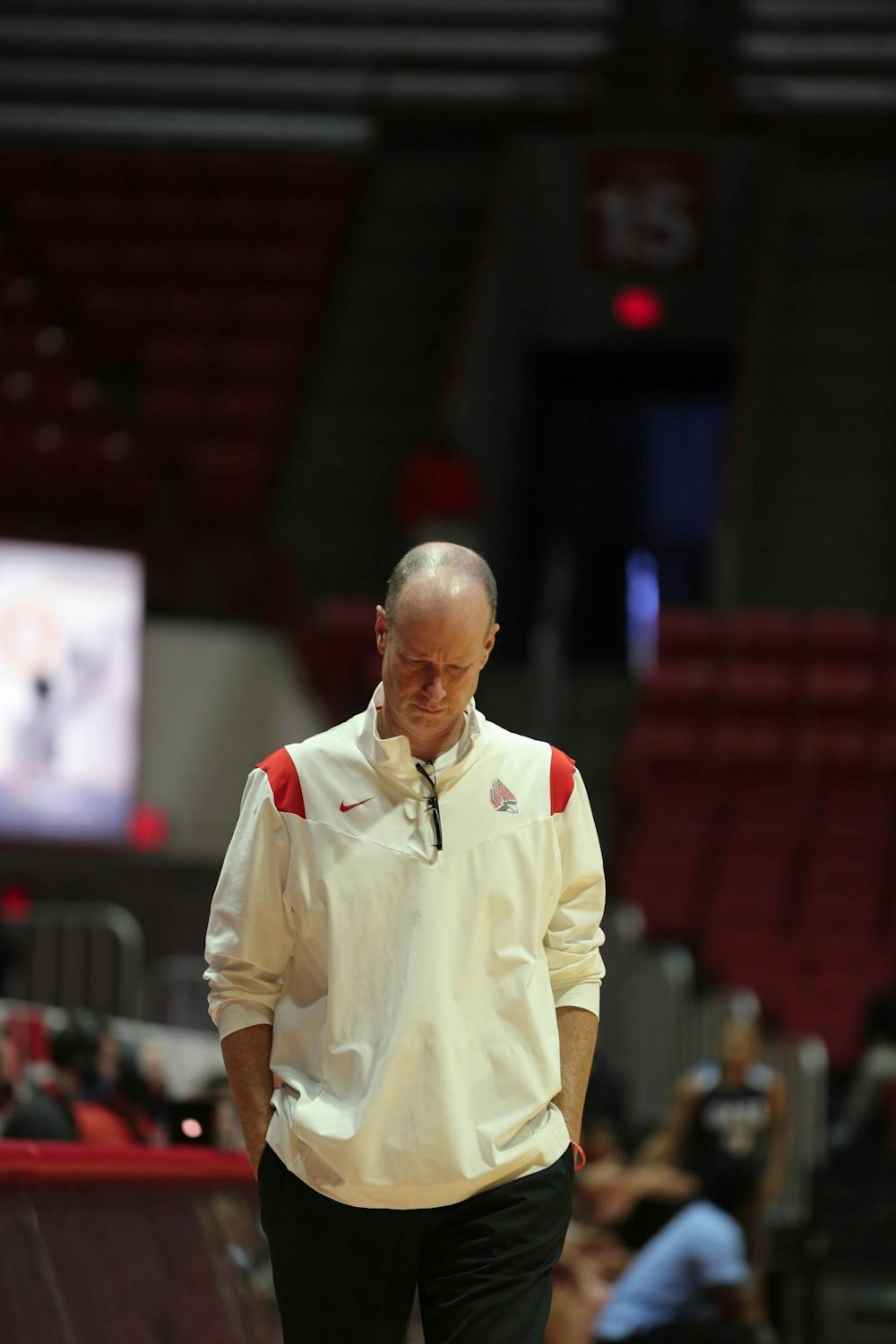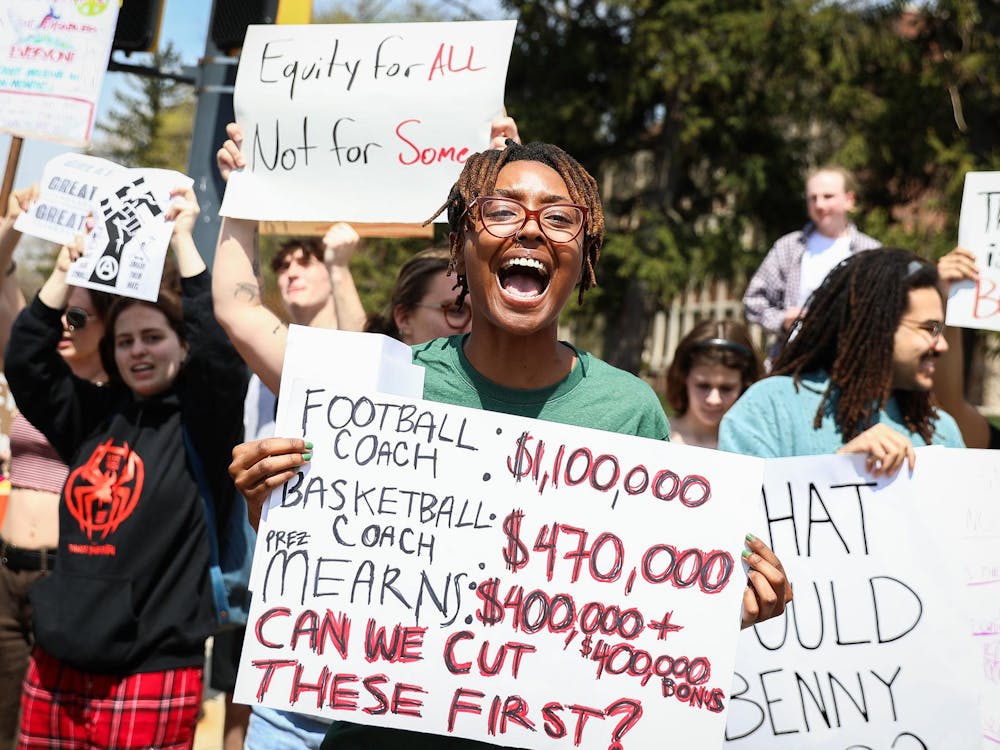Competitive. Hardworking. Accountable. Prideful. Tough. Invested. Selfless.
The seven pillars of Ball State University Women’s Basketball. It is these seven words that head coach Brady Sallee built his program on when he took the reins in 2012.
“They're in our locker room. They're in our office hallway. They're on every practice plan I make. They're on kids’ T-shirts,” Sallee said. “That's all fine and good. Every program prints the T-shirt, has the saying on the back and the whole thing, [but] ours has been the same for 11 years and really, where it starts to take shape is you've got a group of kids that buy into it. Without buy-in, culture is just a poster. It's just a T-shirt. It's really, really shallow. But, man, when you get buy-in behind it, it can be special.”
Sallee said when he began his position at Ball State, the culture coaches and players now pride themselves on did not exist for Ball State Women’s Basketball. Sallee said he landed on these seven pillars through lessons he learned during his coaching experience prior to Ball State, whether as an assistant or head coach and found things he liked and didn’t like and drew on those experiences.
“You have to be genuine,” Sallee said. “You have to be who you are because people see through fake. So if you put a bunch of words up there, and that's not who you are, how in the world is anybody going to buy into that? ... I had to look myself in the mirror and say, ‘Can I walk this walk and talk this talk? Can I be about the same things?’”
Not only was it important for Sallee to buy into the culture but for players and assistant coaches to do the same. Assistant coach Jauwan Scaife, who is in his first year in the position, was able to notice the culture Sallee brought to the program from day one.

Scaife is not only a Muncie, Indiana, native, but from 2009-13, Scaife played for Ball State Men’s Basketball. He said even when he was a player in a different program, he could tell the women’s team had an identity. When he came back to his hometown to fill his current position, he realized the Cardinals’ identity remained true.
“The first thing that stood out was just the level of buy-in that they had with the coaching staff and with Brady. The level of respect and the command that he had with the group, you don't see [that] too often,” Scaife said.
Scaife said he has never coached in a program with an established culture, as when he joined as an assistant at Murray State and Utah State, he was joining a new head coach. Scaife said he was impressed but not surprised by the Cardinals’ culture, saying the players’ maturity is a defining factor in what makes the culture successful. Although the team isn’t very old, he said they’re all mature for their age, allowing them to be self-motivated and focused.
“When you got kids who are in the gym putting in work or you see kids in practice or diving on the floor playing extra hard, [and] you see your best players doing it, it naturally encourages the new kids, the freshmen [and] incoming kids to say, ‘Okay, that is what we're doing here,’” Scaife said. “Then they kind of follow along, and I think that's when you get in games. It's not so much about talent, it's more so about camaraderie [and] chemistry.”
While on scouting trips with Sallee, the Muncie native said he’s learned while Sallee tries to recruit talented players, he focuses more on whether or not they fit the culture. Scaife said this allows for the new players, whether freshmen or transfers, to have a better idea of what’s expected of them and how they play the game at Ball State.
Sallee said this method of scouting means he’s picky, but that makes him more confident in his choices.
“I'm okay with this program not being for everybody,” Sallee said. “I don't feel like I have to get all of them. I just gotta get the right ones …We try to be really, really specific on filling needs, and I think it's helped just this whole process of making sure that the kids we're bringing in the door have the capacity and the want to be a part of a program that is team first.”
One of those players was Sydney Shafer, a senior transfer from Western Michigan, a program that shares a conference with Ball State in the Mid-American Conference (MAC). Like Scaife, Shafer said she could tell from outside the program that Ball State had a strong culture based on family and hard work.
Shafer said the things that attracted her to transfer to Ball State were the offensive system the Cardinals run, the way Sallee fights for his program on and off the court and, most of all, the culture.
“The expectations here are you're going to work hard, or you don't want to be here,” Shafer said. “... Either you're gonna [work hard], or you're gonna get left behind. Nobody wants to be left behind, so you might as well just get in the gym like everybody else.”
The Jackson, Michigan, native said she remembers players like senior Annie Rauch acting goofy and joking around during downtime on the court. However, that attitude changed when it was time to hone in during crunch time.
“I remember playing against them, and it was just like, they don't go away,” Shafer said. “My highest-scoring games were always against Ball State, and it still wasn't enough to beat them. [It] seems like whenever you play Ball State, yeah, you could go on a run, but they're gonna come back anyways and just kill you in a sense."

Rauch was recruited out of Hilliard Darby High School in Hilliard, Ohio, and joined the Cardinals in 2019. She remembers the emphasis put on culture and family, even during the recruiting process.
The senior said when anyone first joins the program, there’s a period of time where players have to get integrated into the culture by driving the core values home in the way they’re expected to talk, act and represent the Cardinals.
“It’s really intentional,” Rauch said. “At the beginning, it can be really uncomfortable … It’s awkward to use that language at the beginning, but you get more comfortable over time.”
Rauch said this process allows for everyone, top to bottom, to buy-in and become immersed in the culture. Becoming ingrained in this culture, she said, makes the Cardinals more comfortable when their backs are against the wall.
“You can just see it when we play,” Rauch said. “We don’t just talk about it, you can see it in action, and I think that’s the difference between us and other teams.”
Sallee said he not only recruits players who fit the system, but it’s the same process when he’s looking to hire an assistant coach. When talking about how assistant coaches like Audrey McDonald-Spencer and Moriah Monaco joined his coaching staff after their playing careers, Sallee said he feels it’s not just the program that draws them back but the university as a whole.
“I'm still blessed and half amazed that I'm still here, [and] I got to come back,” Monaco said. “[Sallee] talks a lot before games and always talks about representing Ball State. It's always about what's across the front of your chest and not the back. That always hits home.”
Monaco, who played for Sallee at Ball State from 2015-18, said culture is talked about within the program more now than when she played. She said when she was a player, the culture was more expected of them, and now Sallee is more vocal about it. The second-year assistant coach feels these are some reasons why the culture is so strong in 2023.
Additionally, Monaco and Rauch said experience is a big factor when it comes to cultivating culture, with 2022’s MAC Championship Tournament championship game appearance being most important for the current locker room.
“With the success that we had and going as far as we did in the [MAC] Tournament and just coming up a little bit short, I think that they saw it firsthand,” Monaco said. “This is really what it's about. This is how important all of this is. Sitting down and talking through some hard stuff [is important].”

After losing in the championship game of the MAC Championship Tournament 79-75, Sallee began to drive home the mantra “five points better” throughout the offseason. It’s been an added phrase to the culture the Cardinals’ core were already bought into.
For new players, like Shafer, this mantra and the culture it rides on were made equally important.
“It is very prevalent in every-single-day things,” Shafer said. “Everybody wants to win. There's a standard here, and everybody's gonna rise to that standard because everybody has the same goal in mind.”
In the 2022-23 season, the Cardinals have taken the “five points better” mantra to heart, already winning more games than they did last season and getting off to the best conference start in program history. As the MAC Tournament inches closer, the Cardinals are positioning themselves for a No. 1 seed.
Even though she hasn’t spent a full season ingrained in the culture of Ball State Women’s Basketball, Shafer said what she’s taken away from the program will last her a lifetime.
“It's gonna carry on not only in the basketball world but after we're all done,” Shafer said. “I think we're gonna be pretty programmed into a winning mindset, and whatever we want to accomplish we can do based on the way that they mentally prepare us every day for something.”
Sallee said although there will be players who aren’t bought into the culture, and along with that comes losing seasons, as well as moral and physical challenges, he knows it’s important to stick to the foundation he built the culture on, otherwise, it won’t stick and won’t bear fruit. He feels the culture the Cardinals use to drive them on and off the court every day is the biggest reason for their success.
“I think we believe that, and that's ultimately probably all that's important,” Sallee said. “Whether we're right in that belief or not, I think we're full bore that that is the difference. When your inner circle is all chugging along to the same belief tones, it makes for pretty sweet harmony. And I think that's what we have in this group.”
Contact Kyle Smedley with comments via email at kyle.smedley@bsu.edu or on Twitter @KyleSmedley_.





